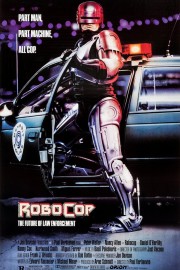Robocop
It’s been a long time since I last watched Paul Verhoeven’s 1987 action thriller, “Robocop.” I actually bought the acclaimed Criterion DVD of it in my early years collecting in the format, mainly because it had become an out-of-print collector’s item. I can’t say I loved the film, though, and ended up giving it to a friend of mine, who was a much bigger fan of the film, one Christmas. Now, with the remake in theatres, it was only natural to revisit the film.
This was Verhoeven’s first American film, and right away, his penchant for jet-black humor and ultra-violence is on display as we see Alex Murphy (Peter Weller), a cop who was just transferred to a new precinct in Detroit; killed on his first patrol when he and his partner (Anne Lewis, played by Nancy Allen) come across a ruthless gang; and then transformed into the ultimate cop when his remains are put into the prototype suit for a cyborg police officer. A cop that can never be killed– just the thing a city of the future, which Detroit aspires to be, needs. But men who tamper in God’s domain have never really had it easy once their creations truly come to life.
The thing that really made Verhoeven a force to be reckoned with in his American films is the way he worked in science fiction. Two of his four sci-fi films (the other three were “Total Recall,” “Starship Troopers,” and “Hollow Man”) were written by Ed Neumeier, and in both of those films (“Troopers” being the other one), there was a satirical edge that set them apart, although it’s tough to appreciate Verhoeven and Neumeier’s particular tone in “Troopers” thanks to the tone-deaf performances. Neumeier wasn’t “Robocop’s” only author (he developed the script with Michael Miner), but it’s ultimately his and Verhoeven’s vision, and it’s quite a stunning one. At it’s core, “Robocop” is a riff on Frankenstein, but more importantly, the film takes on the corporate greed and amoral decadence of the ’80s in a way that doesn’t feel dated at all, and in fact, remains prescient to how corporate America still seems to operate. For those unfamiliar with the film, the Robocop project was developed by OCP, Omni Consumer Products, as a way of making actual law enforcement obsolete. It goes without saying that OCP is corrupt: at the corporate meeting where their security team shows off the completely-robotic ED-209, one of their own is gunned down due to a programming error, and no one bats an eye. Looking at it now, it’s easy to see how corporations in the real world have worked to privatize law enforcement directives, and military contractors have worked on creating their own robotic peacekeepers. Thankfully, we haven’t yet reached the time when something like an ED-209 exists, or even a Robocop, where mortality is relative, but it’s not hard to see how people want to take us in that direction. The question Verhoeven asks in “Robocop” is, should we go there?
Of course, the film isn’t just a social commentary; the film is an action film first and foremost, and that’s a big part of where the film’s greatness lies. I get why people are so passionate about the film– Verhoeven created a great blend of brains and brawn that sets it apart from the muscled action films that were flooding theatres in the ’80s. This isn’t just a mindless work, but even if Verhoeven and Neumeier hadn’t delivered a strong, satirical story, the film would still work as a slick, exciting action thriller. Weller and Allen make a great pair of heroes; yes, Weller is the big standout as the film’s Frankenstein monster, but Allen leaves a more human impression as Lewis, who starts off as a tough cop, and stays that way, but finds herself sympathetic to Murphy, especially when he becomes an outcast as OCP and the policeman’s union stall in negotiations, and the cops go on strike, leading to a truly lawless Detroit. As the bad guys, both Ronny Cox (the leading executive at OCP who has installed a failsafe in Robocop to go with his corrupt bribing of public officials) and Kurtwood Smith (Red from “That ’70s Show”), who plays the gang leader who kills Murphy early on, have the acting chops and ruthless menace to be believable villains, and turn in memorable performances, thriving under the direction of Verhoeven, who wouldn’t know how to make an obvious movie, or a forgettable one. Bad movies? Yeah, he’s made some (“Showgirls,” in particular, stands out), but the Dutch auteur is too provocative to make one that doesn’t linger in our memories. “Robocop” does just that, and for reasons that aren’t always clear on the first viewing.










